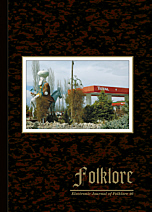Humorous Interpretations of Abbreviations as a Socio-Cultural Phenomenon
Humorous Interpretations of Abbreviations as a Socio-Cultural Phenomenon
Author(s): Piret Voolaid Subject(s): Customs / Folklore
Published by: Eesti Kirjandusmuuseum
Keywords: abbreviations; abbreviation parodies; abbreviation riddles; acronyms; folk humour; group lore; quasi-acronyms; slang
Summary/Abstract: The article discusses the nature of abbreviation jokes, the possible formulation principles, relations to humour and slang and the way their interpretation depends on the socio-cultural context. The abbreviated riddle corpus, (ca 3,000 texts of about 330 types) stored in the Folklore Archives of the Estonian Literary Museum, constitutes the source material for the study. The material has been systematised and presented in the database Eesti lühendmõistatused or Estonian Abbreviation Riddles (Voolaid 2004). The database provides a fine overview of alternative folkloric interpretations of abbreviations and acronyms in different periods and allows us to diachronically observe and describe the transformation of the genre in the socio-cultural context. The article introduces the possible ways of systematisation and formulation principles of the alternative interpretations of Estonian abbreviations (abbreviation parodies) bordering folklore and language. Folklorists have approached the phenomenon as a subgenre of riddles: the question part consists of a conventional abbreviation, whereas the explanation provided in the answer part is radically different from the conventional one; it is witty and humorous, often with a political or sexual undertone. A single abbreviation may produce several alternative interpretations, including the conventional and the folkloric explanation. Alternative (often witty) interpretation of abbreviations can be considered an important source of the slang lexicon of group languages (e.g., exclusive subcultures, professional parlance) or secret language.1
Journal: Folklore: Electronic Journal of Folklore
- Issue Year: 2010
- Issue No: 46
- Page Range: 61-82
- Page Count: 22
- Language: English

